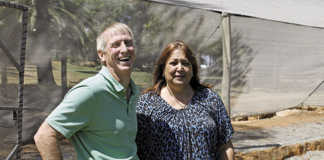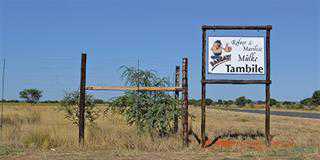Rumours about George Barnard’s success and farming expertise abound, but he remains modest, explaining that success is not measured by the number of farms you own, but rather by knowing your purpose on earth and living it out.
A contract grower for several food companies, George knows how to farm. He has numerous awards and achievements behind his name, most recently as finalist for the 2011 Grain SA Farmer of the Year and the 2009 TAU SA Young Farmer of the Year.
“It takes a team to be successful and you must surround yourself with the right people, those who share your passion and aren’t negative,” says George, “You mos know behind every successful man is a woman,” referring to his wife Marlene.
“She supports me a lot on the farm.”
Know the ‘whys’
George bought his farm in 2000 and gradually expanded his land to 600ha with 250ha under irrigation.
He comes from a family of farmers and is very grateful that his father taught him the value of hard work. “He grew cotton and tobacco and there was no such thing as spending school holidays with your friends – you had to go to the farm and work.
“The Afrikaner culture is such that parents always show their children how to do something. If you know the ‘hows’, then you will always have a job. If you know ‘why’ something is done, you will be the boss, but Afrikaners don’t always explain the ‘why’s’ to their children. My father taught me the ‘hows’ and with grace and prayer I found out the ‘whys’ and got it right.
“I learnt many lessons early on in life and these have brought me to where I am. You don’t have much of a choice as to what happens to you, but you have a choice as to how you react to it. Crop failure happens, but this motivates me to make the next harvest twice as good.”
Contract growing
As an irrigation farmer George relies on the Loskop Dam for water. Although Groblersdal is not a high rainfall area, receiving around 600mm a year, Loskop Dam’s catchment area receives a lot of rain, putting irrigation farmers in a better position than in many other areas.
George has contracts to produce vegetables for Simba, McCain, Nature’s Choice and Tiger Brands, and a contract with Monsanto to produce maize seed.
He rotates winter and summer crops and farms with potatoes (100ha), maize (100ha to 200ha, depending on the price), sweetcorn (50ha), peas (50ha), beans (40ha to 60ha) and wheat (60ha to 100ha, depending on the price).
He achieves a yellow maize production of 16t/ha under irrigation, sometimes reaching 18t/ha. “Nine out of 10 years I plant yellow maize because the yield is higher than that of white maize,” he explains.
“I plant white maize if the price is likely to increase. This happens from time to time when there is a shortage, so I need to know what is happening on global markets.”
Growing seed for Monsanto serves as a back-up income to carry George through the difficult years. “Some years it is not profitable to plant maize, so I increase the area planted for Monsanto. When the maize price increases, I plant more grain maize.”
Peas and beans are quick cash crops that need only three months in the ground, giving George enough time to harvest the vegetables and plant early maize.
Soil separation
George stresses that the success of a crop lies in the soil preparation. “The best seed and water in the world won’t help if the soil is not right.”
He discs crop residue into the soil and then uses a modified chisel plough with a roller to loosen the soil.
“This roller is the last implement that goes through the land so there is nothing that compacts the soil after it has been loosened. This makes a perfect seedbed.
“Because the top 100mm of the soil is mostly plant residue, maximum water penetration takes place. The soil on the farm is very fertile and is a light grey colour. It is easy to manage because the crop indicates immediately when a nutrient is missing. George no longer uses only chemical fertiliser as it “messes up the soil over the years”.
“Unfortunately, using only organic fertiliser is not profitable, so I use a mixture of organic and chemical fertiliser I get from Agron.
“Fertiliser application is crucial and I aim to improve the soil to get better results while using less fertiliser. My applications are smaller, but applied more often and over a longer period. This is logical to me and I don’t believe in giving a plant all of its nutrients in one go before it reaches a certain age.”
George samples and has the soil analysed every three years, supplementing it where necessary. “The calcium:magnesium ratio is crucial, as crops will not flourish if it is not correct.”
Farming with technology
George explains that technology and farming are inseparable. He samples plant sap during crucial times to monitor the nutrient status. “This,” he says, “makes a huge difference.”
He also uses an efficient irrigation scheduling programme. “The most important thing about an irrigation is how to manage water. You can’t kick the soil a few times to decide when it’s time to irrigate.
For water to go into the soil, something must come out, which is oxygen. You must therefore balance irrigation because the plant needs water and oxygen.
“My programme takes into account temperature, wind speed and humidity to tell me how much to irrigate. I don’t rely solely on the programme, but also use my own knowledge and observations, which makes all the difference.”
George has his own weather station on the farm, using it for irrigation scheduling, among others.
“My operation is largely mechanised. No one handles a potato in the land as I use a potato harvester. I have structured my farm to make the best use of the fewest possible workers. But I treasure the 12 permanent workers I have, pay them well and cultivate passion and pride in what they do.
“Mutual respect is very important. They will only respect me if I respect them.”
George recently imported a Monosem twin-row maize planter from Germany to replace his conventional single-row planter.
“It is a new concept that plants two rows of maize in a zigzag pattern in what would normally be one row. This new planter adds an extra 20 000 plants to a hectare, to increase the yield to 20t/ha.”
Managing risk
“A farmer always has risks. To be successful, you need to know how to manage those risks. I have to delegate the risks so that I can focus my attention on farming. The more risks I have, the better my chances of failing.
“Contract farming guarantees me a price and a market, eliminating a lot of risk,” George explains. “The South African Futures Exchange (Safex) is also a tool to manage risk, but many farmers will touch a puff adder before they touch Safex.
This is because many use it incorrectly and then burn their fingers. “Farmers must use Safex to hedge, not speculate, so that they can set their minimum price when the offered price is high.”
His own 1 000t silo on the farm enables George to harvest grain at his own pace and save on transport costs to the local co-op’s silo. This saves him R65/t on transport and R35/t in handling fees.
“This also means that I am less of a price taker. I can dictate my price up to a point. “If every farmer had their own silo we would be in a better position to determine our prices, but because everything is sent to a co-op silo, there is always stock available.”
George explains that insurance against weather-related disasters is essential in managing farming risk.
“Lastly, a farmer must manage electricity use, as price hikes can put you out of business. “I irrigate only when necessary, the right amount at the right time of day. I don’t waste water irrigating a crop I don’t specialise in, but rather use my water allocation to produce an above standard crop.”
Farming with a purpose
George says that his greatest achievement is being able to live out his God-given purpose – to add value to the people who work for him and to the community.
“We all have a responsibility in our professions to decide who we are and where we are going. We must accept stewardship for what we have been given. I am privileged to have a talent for farming and do well in what I have a passion for.”
George bemoans the fact that some successful farmers don’t share their secrets with others. “Nobody wins if you are successful but don’t share your knowledge and help others to also be successful.”
Contact George Barnard on 082 322 7471 or email [email protected].













